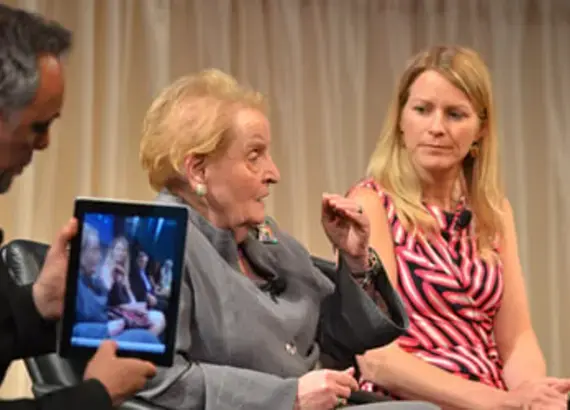
Success Story
Leaders Come Together to Discuss ‘Democracy in a Tech-Empowered World’
Technology is having a profound effect on interactions between democratic governments and the citizens they represent, making it easier for citizens to amplify their voices, organize and hold governments to account. But democratic institutions – governments, parliaments, and political parties – have often been slower to take advantage of these new ways to engage citizens. Many use outmoded tools to listen and even older processes to respond.
A two-day conference held in Silicon Valley April 23-24 brought together senior tech leaders, innovators, policymakers and scholars from around the world to explore how technology is changing the ways democracies function and to help them bring their responses into the digital age.
“When you hear political disruption you think of governments falling,” said Tim O’Reilly, founder of O'Reilly media. “What if you think of disruption as improving the way governments work?”
O’Reilly was part of an April 24 public panel — the culminating event of the conference — that delved into how technology is transforming society and governance, and how partnerships between governments, citizens and tech companies can help address the disparity between the way governments and citizens communicate.
“We’re in the middle of a million small disruptions that will end...in a very different kind of society,” said O’Reilly.
The panel, at the Computer History Museum in Mountain View, Calif., featured O’Reilly; Swati Ramanathan, co-founder of the Janaagraha Centre for Citizenship and Democracy in India; Madeleine Albright, NDI chairman and former U.S. Secretary of State; Moisés Naím, author of The End of Power; and Katie Stanton, vice president of international market development at Twitter. It was moderated by Andrew Rasiej, founder of Personal Democracy Media.
“Partially what has happened as a result of technology is that the demands of the people have been released,” said Albright. “And governments aren’t in a position to absorb all the information.”
“Power has become easier to acquire, much harder and constrained to use, and it's more fleeting, easier to lose,” Naím said during the panel, noting that technology has contributed to a global trend of politics becoming more fragmented and yielding less power, even for authoritarian governments.
Panelists discussed issues such as how to help governments better understand the power of technology to interact with citizens, and how to empower governments to adapt to technology that citizens are already using.
“Government should go to where the citizens are,” said Stanton.
Panelists agreed that partnerships between countries, civil society groups and citizens are essential to harnessing technology’s potential as a force for change, and moving from the idea of “e-government” to what Rasiej called “we-government.”
“For all the power of technology,” said Ramanathan, “it really can’t work alone.” While technology is an extraordinary force for change, harnessing its potential, especially in developing democracies, often requires partnerships between governments, citizens and private companies, she said. “No institution or individual alone can create change.”
 Former Vice President Al Gore and former Secretary of State Madeleine Albright met before a conference session Silicon Valley about the impact of technology and innovation on democracy. Photo by Rodney Searcey.
Former Vice President Al Gore and former Secretary of State Madeleine Albright met before a conference session Silicon Valley about the impact of technology and innovation on democracy. Photo by Rodney Searcey. Conference presenters and participants included former Vice President Al Gore; senior officials from the White House, State Department and the U.S. Agency for International Development; Roland Rich, executive head of the United Nations Democracy Fund; Anders Johnsson, secretary general of the Inter-Parliamentary Union; and Robin Carnahan, NDI board member and former Missouri secretary of state. Other participants were Oras Tynkkynen, vice chair of the Finnish Parliament's Committee for the Future; Salvör Nordal, chair of the Icelandic Constitutional Council; Amira Yahyaoui, founder and president of Al Bawsala in Tunisia; and Marina Wiesband, former political director of the German Pirate Party.
The gathering was sponsored by NDI, the Stanford University Center on Democracy, Development and the Rule of Law (CDDRL), Omidyar Network, and the International Institute for Democracy and Electoral Assistance (IDEA).
At a reception for conference participants at the campus of Google in Mountain View, open government advocates Ellen Miller, co-founder and executive director of Sunlight Foundation; Jennifer Pahlka, founder and executive director of Code for America; and Jorge Soto, co-founder of Citivox, gave presentations on using technology to increase citizen involvement and oversight of government. The following evening at a reception hosted by San Francisco Mayor Edwin Lee at City Hall, Jay Nath, San Francisco chief information officer, gave a presentation on ways governments can use technology be more transparent and elicit more input from citizens.
Read more:
- How Twitter and Facebook Are Changing Democracy»
- Press Release: Madeleine Albright to Discuss Democracy and Technology at Silicon Valley Event»
- Technology, Transparency and Government: NDI Staff on Using Technology for Democracy»
- Tech@State Explores How Technology Can Boost Confidence in Elections Worldwide»
Published April 26, 2013
